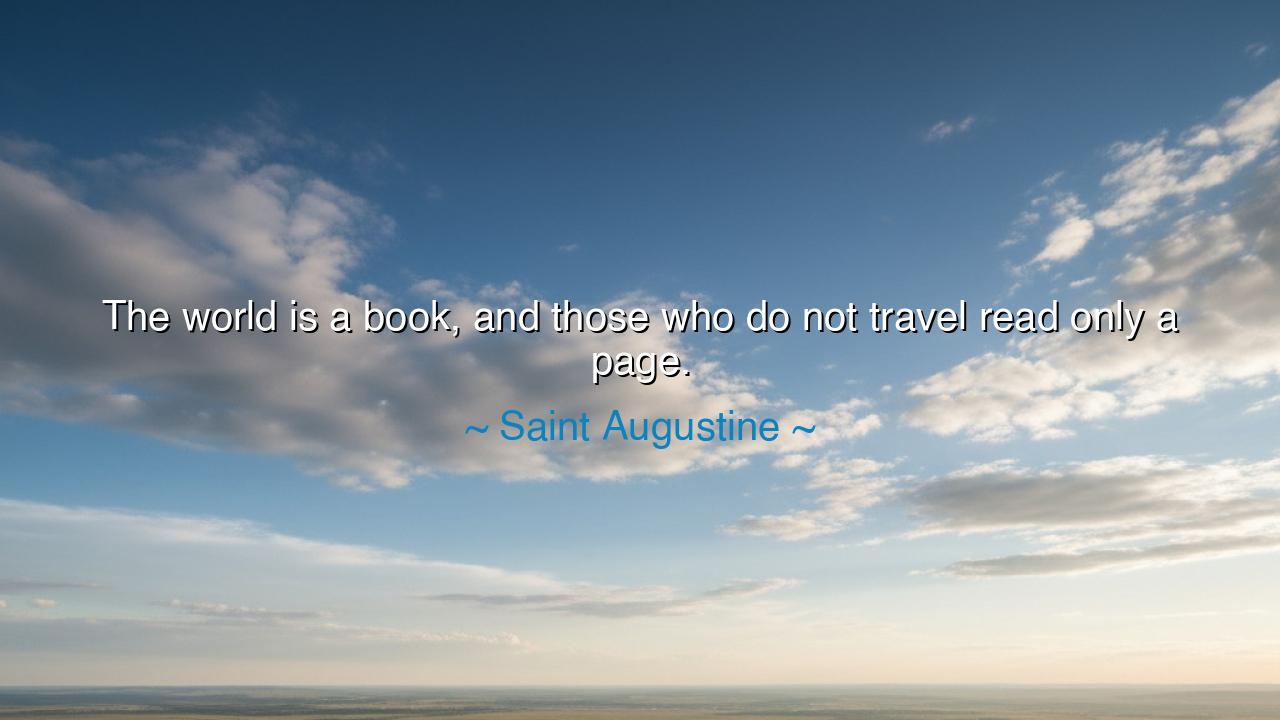
The world is a book, and those who do not travel read only a






The holy bishop and philosopher Saint Augustine once spoke a line that has echoed through the centuries: “The world is a book, and those who do not travel read only a page.” These words, poetic and eternal, remind us that creation itself is a grand text, written not in ink but in rivers and mountains, cities and deserts, cultures and peoples. To remain still, refusing to see beyond the narrow horizon of one’s own birthplace, is to skim a single page and believe one has understood the whole. But to travel, to walk across borders and seas, is to turn the pages of this divine book, uncovering wisdom hidden in its countless chapters.
When Augustine calls the world a book, he means that life is a text written by the Creator, one that teaches through experience, observation, and encounter. Every nation is a paragraph, every people a line, every custom a metaphor revealing something of the human condition. Just as no single page can convey the fullness of a story, no single land can hold the fullness of truth. Only by moving beyond one’s familiar corner does the reader begin to glimpse the depth of the tale.
The words “those who do not travel read only a page” strike at the danger of narrowness. Many believe that the world as they know it is the world entire—that their customs are the highest, their people the measure of all others. Yet this is blindness, a prison of the spirit. The traveler, by contrast, discovers humility. He learns that his way is not the only way, his people not the only people, his truth not the only truth. Travel breaks pride, enlarges vision, and turns ignorance into wisdom.
History provides shining examples of this truth. Consider the journeys of Ibn Battuta, who crossed deserts and seas, visiting Africa, India, China, and beyond. His writings became a library of human experience, revealing wonders his homeland alone could never teach. Or think of Marco Polo, whose travels unveiled to Europe the richness of the East—its spices, its silk, its vast empires. Each became not merely a traveler but a reader of the great book of the world, and their lives were transformed into testimonies for others who could not journey themselves.
The origin of Augustine’s insight rests in his own life. Though he became a bishop in Hippo, he was himself a traveler—journeying across the Mediterranean world, from Africa to Italy, from Carthage to Rome. He knew firsthand that each land carried new lessons, new challenges, new revelations. His faith taught him that God’s truth was universal, and travel showed him how it manifested differently in every people and place. For Augustine, to travel was not only to see, but to understand more deeply the vastness of creation.
The lesson for us is profound: do not mistake one page for the whole book. Seek out the fullness of life by moving beyond the familiar. Walk into foreign lands not as conquerors, but as readers—ready to learn, ready to be humbled, ready to discover the beauty of difference. Every journey, whether near or far, adds a page to the story you are living, a page that cannot be replaced by rumor, story, or hearsay.
Practical action follows naturally. If you can, travel far—see new lands, meet new people, listen to their stories. If you cannot travel far, then travel in spirit: read of distant cultures, befriend those from other lands, step beyond the comfort of your own traditions. Let your soul be a reader of many pages, not confined to one. And in doing so, you will see not only the world more clearly, but yourself as well—for in the diversity of creation, the human heart discovers its unity.
Thus, Augustine’s words endure as both poetry and command: “The world is a book, and those who do not travel read only a page.” To future generations, let this teaching be passed down: do not settle for a single page, but read widely, live fully, and let every journey add to the great story of your soul. For only the one who turns many pages can glimpse the wholeness of the tale.






AAdministratorAdministrator
Welcome, honored guests. Please leave a comment, we will respond soon